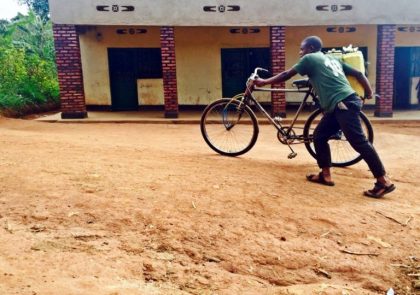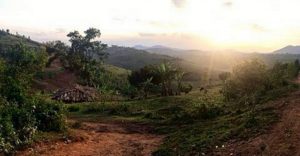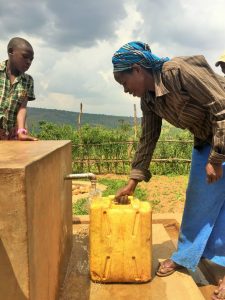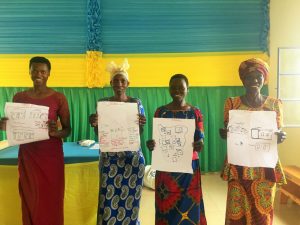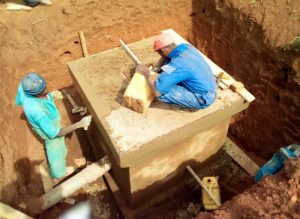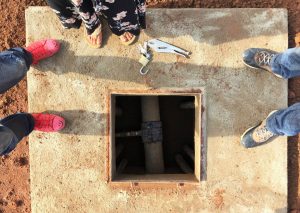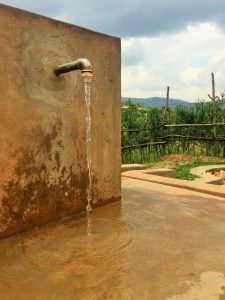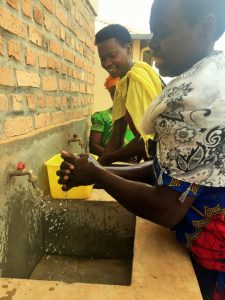This project is made possible through the partnership of WATER CHARITY and the NATIONAL PEACE CORPS ASSOCIATION. ![]()
This project has been completed. To read about the conclusion, CLICK HERE.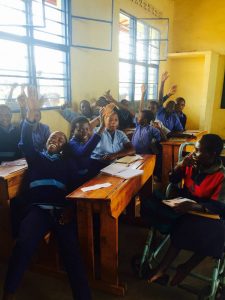
Location
This project summary has been redacted for security reasons to omit the specific project location.
Xxxxxxxx Village, Bukomeye Cell, Mukura Sector, Huye District, Southern Province, Rwanda
Community Description
Mukura Sector is located in Huye District in the Southern Province of Rwanda. Over 22,000 community members live in 34 villages. Xxxxxxxx Village, where the project will be completed, has a population of 539 people in 127 households.
Much like the rest of Rwanda, the landscape of Mukura is typified by a succession of rolling, terraced hills covered in coffee and banana trees, corn crops and rice fields. The sector is within 10km of the district hospital, university hospital, university, bus station, and other services.
Mukura is a densely-populated sector. Most community members work in the agriculture sector, and a majority of females in Huye are small- scale farmworkers. Few people have electricity in Mukura (8.8%), though the number is steadily increasing. A combination of mud bricks, cement, and tree trucks is used to construct most of the houses in the sector with houses grouped into a umudugudu or village. A village center is often a place for socialization, buying and selling goods, and fetching water.
The epicenter of health in the sector is Mukura Health Center, which was founded in 2014 with the goal of improving access and use of quality health care in the sector. The health center sees over 2,000 patients each month, most patients being seen for malaria, gastrointestinal disease, or respiratory infections.
In Rwanda, three community health workers (CHWs) from every village work with men, women, and children to provide various health services. Of these three, one CHW is specifically assigned to work with pregnant women, mothers, and children. The CHWs are the driving force behind a number of health-related projects in Rwanda. The Peace Corps Volunteer (PCV) works directly with the health center, though this project will not directly impact water access at the health center.
 Problem Addressed
Problem Addressed
Water availability and accessibility are notable issues in Rwanda. Despite national and local efforts, a significant portion of the community in Mukura Sector lacks access to improved water sources. In Mukura, 22.4% of people are receiving water from unprotected sources, 19% of which is from an unprotected well/spring. Currently, community members in Xxxxxxxx village fetch water from a protected tap in a neighboring village 1.5 km away, or from a nearby, unprotected river.
Access to clean water, along with lack of hygiene education, has significantly contributed to health issues in Mukura. Nearly 15% of visits to the health center in Mukura are related to gastrointestinal conditions, a majority of which can be attributed to water-borne illnesses. Other conditions treated at the health center (dental problems, acute respiratory infections, etc.) may also be related to poor hygiene.
While many women in Rwanda wash their hands before eating, practices relating to washing hands when dirty, after using the toilet, or before meal preparation are less common. There is also a relationship between hygiene and malnutrition, another pressing issue in Mukura Sector.
Finally, few girls pursue educational opportunities or occupations in STEM fields in Rwanda. Despite national efforts towards gender equity, women and girls in rural areas are often pushed into traditional gender roles. Only 2.5% of women attend university in Rwanda. Early dropout is noted as an issue in Mukura sector as attendance rates decrease significantly in after primary school.
Project Description
This project is to build a water system to provide for the needs of the village.
Based on observations, surveying, and interviews, poor hygiene has significantly impacted health in the community. Government officials and the health center supervisor were actively involved in site selection and overall project design. Xxxxxxxx Village was specifically chosen as the site for a new water system because of the distance to the nearest water tap or water source. Working with a local engineer and technician, the project, described below, was planned.
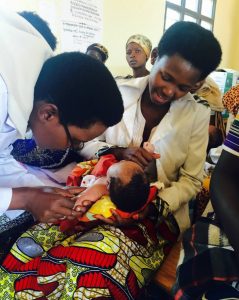 The water infrastructure project will take place in Bukomeye Cell, extending the pipeline from Bukomeye Village to Xxxxxxxx Village across 1.5km of land. The vertical distance of the pipeline is negligible since the pipes will follow an existing dirt road that runs across the side of the mountain.
The water infrastructure project will take place in Bukomeye Cell, extending the pipeline from Bukomeye Village to Xxxxxxxx Village across 1.5km of land. The vertical distance of the pipeline is negligible since the pipes will follow an existing dirt road that runs across the side of the mountain.
The project will install a water station in the village center, building from existing infrastructure. Water pipes currently in place distribute water that is filtered by a local filtration center.
Water from small ground sources and a small river is treated at a water treatment plant in a nearby sector and flows into the current water system. PVC pipes (3/4” and 1” in size) will be used to construct the new system.
The tap will be created using bricks with a concrete slab on the bottom and two faucets. A manhole, also constructed with bricks, will be built and used to open or close a valve when the pipeline is damaged.
The community will significantly contribute to the project. Trenches will be dug (.8m deep) and backfilled by community members as part of scheduled service days known as Umuganda. The community will also provide a portion of the materials and materials transportation.
Most of the funds from Water Charity will pay for the installation and materials for the water tap, piping, and salary for the engineering team.
The water infrastructure project will provide the community in Xxxxxxxx with a nearby filtered water access point, affecting 127 households and over 500 people. This will allow the community to fetch water in less than 10 minutes as needed, and discontinue the use of unprotected water sources.
During the construction of the water line and tap, the PCV and counterpart will implement a hygiene education program targeting women and children. The 34 maternal and child health CHWs in Mukura Sector and nurses employed by Mukura Health Center will be trained on good hygiene practices and behavior change models, specifically focusing on issues affecting pregnant mothers and children.
A portion of Water Charity funds will fund per diem for this training. During the 3-month project period, CHWs will meet with all pregnant women in the sector. Promoting behavior change (hygiene education) in conjunction with the water infrastructure project will allow the community to improve their health.
A secondary aspect of the project will teach young women interested in STEM fields about water engineering. The PCV, a local mathematics teacher, and the water technician will work with the local school to teach girls about basic engineering principles and allow for practical experience in planning a water system. Topics will expand on lessons from the curriculum and are meant to be interactive. The students will visit the water project installation site to develop hands-on skills, funded through the grant. The students will also be asked to set goals for their future with the intention of guiding girls towards tertiary education and to create an environment where girls are equally equipped to succeed and explore engineering and other STEM fields.
Project Impact
539 people will benefit from the improvements in water infrastructure and 300 will benefit from hygiene education.
Peace Corps Volunteer Directing Project
A. Trocle
Monitoring and Maintenance
Sustainability is the cornerstone of the project design. A session following the construction of the tap will focus on educating the community to protect the water system in the area. Ownership of the system will make the community accountable for any damages. The PCV will work with a local office to set up a framework for the reporting of issues.
A trial committee of 2 people will be formed in Xxxxxxxx and Shingangabo village which will be responsible for the protection of water distribution lines. They will be responsible for reporting maintenance issues. If the committees are successful, the project will be expanded to all villages. The local water and sanitation corporation will also maintain some of the piping based on their registration agreement.
Community officials were key to the development of this project. Their ongoing support for the maintenance of the system is paramount to sustainability.
Village officials will choose the community member who will work to collect water payment. The worker will ensure they will make a payment on time to avoid having the water turned off to the community. The local water corporation charges ~7 RWF per jerrycan of water distributed to public taps.
Community members will regularly de-weed the area surrounding the tap. The PCV will discuss the water infrastructure project with CHWs from Xxxxxxxx village to coordinate this regular cleaning.
The Supervisor of CHWs will maintain the hygiene education lessons to be used in the future. A yearly plan for CHWs education will be created in conjunction with other health priorities. Repetition of lessons will give CHWs the opportunity to learn material and better disseminate information.
Monitoring and evaluation of the project will continue for 3 months after the project is completed by assessing the number of households that are accessing the tap, assessing knowledge of good hygiene practices, and analyzing monthly morbidity data from the health center regarding hygiene-related illnesses.
Comments
In general, the project will increase the capacity of the community by providing a closer improved water source which will affect the daily lives of community members. The project will contribute to building a number of skills in the community.
During Umuganda, community members will learn the skills needed to install a portion of a water distribution system. The project will also provide professional development through employment for one worker who will be responsible for receiving payments from the community and paying the water company monthly. The project is also intended to develop capacity by creating a system to properly maintain water infrastructure.
This project has been funded by an anonymous donor.
Conclusion of Makura Sector Water System Project – Rwanda
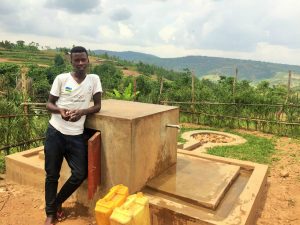 This project has been completed under the direction of Peace Corps Volunteer Ashley Trocle. To read about the start of the project, CLICK HERE.
This project has been completed under the direction of Peace Corps Volunteer Ashley Trocle. To read about the start of the project, CLICK HERE.
The project was designed to build a water system to provide for the needs of the village.
Ashley reports:
The water infrastructure project in Mukura Sector consisted of 3 parts: water tap installation, hygiene training, and STEM education. The work was done over the course of 3 months. In part 1, a trench was dug by community members, connecting the new tap to an existing water system. The tap and manhole were built using local workers with oversight by the technician and Peace Corps Volunteer. The newly installed tap now provides water from a protected source to 148 families from 2 villages.
In part 2, community health workers (CHWs) were trained to teach pregnant women and new mothers about basic hygiene habits and encourage behavior changes. CHWs have met with pregnant women and mothers to discuss how to adopt good hygiene practices. The program has reached over 200 women and will continue to educate new mothers and women with malnourished children.
Finally, the project included a STEM education component at the local school. In addition to STEM lessons, ten female students gained hands-on training on how water systems are built and maintained.
Though the main objective of the project was to provide clean water to the community, the tap installation and hygiene promotion engaged community members in many unexpected ways. Claudine Uwimana is a young mother in Gasunzwe. The project impacted Claudine in many of the ways the planning team had hoped: she was able to provide her family with clean drinking water and decrease her time to fetch water. She also has more time to focus on keeping up with good hygiene practices in her home and ration waterless. She can wash clothes more often, spend less money on water, clean her own and her children’s hands more thoroughly, and prevent jiggers by cleaning her feet regularly. The greater availability of water has allowed Claudine to work more hours making crafts in the village.
The project has empowered many men and women in the community to greater develop their skills, take command of their lives, and improve their health.
We extend our thanks to Ashley for completing this important project.
